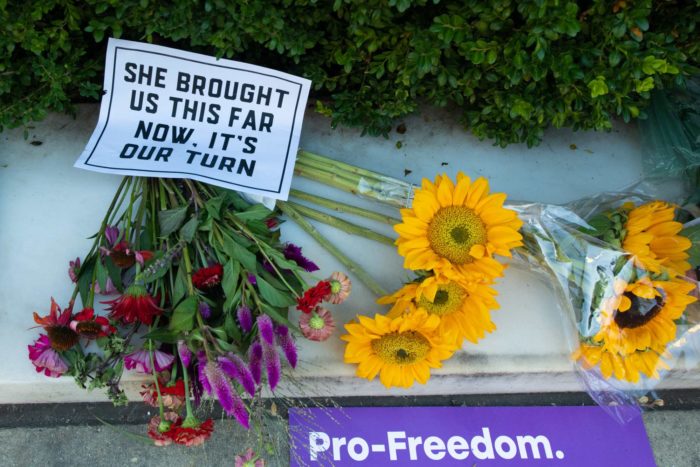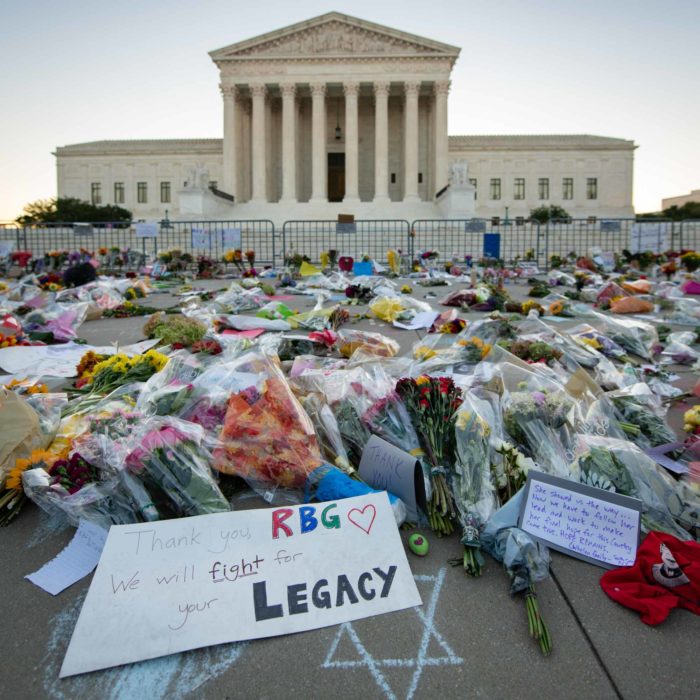Top Class Actions’s website and social media posts use affiliate links. If you make a purchase using such links, we may receive a commission, but it will not result in any additional charges to you. Please review our Affiliate Link Disclosure for more information.
Ruth Bader Ginsburg, longtime Supreme Court justice, champion of women’s rights and unlikely cultural icon, died Friday in Washington, D.C. She was 87.
Justice Ginsburg died at her home, surrounded by family, due to complications from metastatic pancreatic cancer, according to an obituary published by NPR.
She had been in and out of the hospital in recent months, undergoing procedures and treatment for the illness, all the while continuing to hear arguments and otherwise perform her work as a justice.
She fought tirelessly for civil rights and to secure equal protection under the law for women, leaving behind a legacy of legal opinions that have helped open doors for those who might never have been afforded certain opportunities.
‘A Jurist of Historic Stature’
As news of Ruth Bader Ginsburg’s passing reached her Supreme Court colleagues, each shared their personal grief at her death, as well as their hope for the future.
In his statement announcing Justice Ginsburg’s death, Chief Justice John Roberts said the United States had “lost a jurist of historic stature.”
“We at the Supreme Court have lost a cherished colleague. Today we mourn, but with confidence that future generations will remember Ruth Bader Ginsburg as we knew her — a tireless and resolute champion of justice.”
Justice Stephen G. Breyer said he heard of Justice Ginsburg’s death while reciting the Mourner’s Kaddish at a Rosh Hashanah service, according to a release from the Supreme Court.
“I thought: a great Justice; a woman of valour; a rock of righteousness; and my good, good friend. The world is a better place for her having lived in it. And so is her family; her friends; the legal community; and the nation.”
Justice Clarence Thomas, who first met Justice Ginsburg in 1990, according to People magazine, said she had been “a picture of grace and courage” through her health challenges and the loss of her husband.
“The most difficult part of a long tenure is watching colleagues decline and pass away,” Justice Thomas said. “And, the passing of my dear colleague, Ruth, is profoundly difficult and so very sad. I will dearly miss my friend.”
“She served our Court and country with consummate dedication, tirelessness, and passion for justice,” Justice Sonia Sotomayor said. “She has left a legacy few could rival.”
Justice Elena Kagan called Justice Ginsburg a hero, saying she had inspired her and helped guide her in many matters.
“I will miss her — her intellect, her generosity, her sly wit, her manifest integrity, and her endless capacity for work — for the rest of my life.”
‘I Dissent’
Joan Ruth Bader married her husband of 56 years, Martin Ginsburg, in 1954, according to Time magazine.
She entered law school at Harvard in 1956 as one of nine women in a class of 500 men. Shortly thereafter, Martin, who was a year ahead of her in school, fell ill with testicular cancer.
Ruth, now caring for a toddler and sick husband, not only continued to excel at Harvard, but helped Martin excel, as well, according to Time.
She would attend class, get notes from Martin’s peers, head home and prepare dinner, care for Marty and type his senior paper as he dictated, then return to her own studies as late as 2 a.m.
According to the Time report, she remained at the top of her class, rarely sleeping more than three hours in a night.
In 1972, the Ginsburgs together argued Moritz v. Commissioner, which centered on gender discrimination against a man, according to Time. The case marked her first big win and set her on the path toward breaking down laws allowing women to be treated differently than men.
U.S. v. Virginia
Justice Ginsburg wrote the majority opinion in a 1996 case that secured new freedom for women in their academic pursuits.
The Supreme Court ruled 7-1 in United States v. Virginia, that the Virginia Military Institute’s (VMI) male-only admissions policy violated the 14th Amendment’s Equal Protection Clause, according to Insider.
In her opinion, Justice Ginsburg said “today’s skeptical scrutiny of official action denying rights or opportunities based on sex responds to volumes of history.”
“A prime part of the history of our Constitution, historian Richard Morris recounted, is the story of the extension of constitutional rights and protections to people once ignored or excluded,” she wrote. “… There is no reason to believe that the admission of women capable of all the activities required of VMI cadets would destroy the Institute rather than enhance its capacity to serve the ‘more perfect Union.'”
Burwell v. Hobby Lobby
Justice Ginsburg wrote a dissent in 2014 in Burwell v. Hobby Lobby, in which the Supreme Court ruled certain for-profit companies cannot be required by law to pay for certain contraceptives for their employees.
She warned the court had “ventured into a minefield,” according to CNN.
“Any decision to use contraceptives made by a woman covered under Hobby Lobby’s or Conestoga’s plan will not be propelled by the Government, it will be the woman’s autonomous choice, informed by the physician she consults,” the liberal justice wrote, noting that a cost barrier existed for many women wishing to obtain birth control.
Little Sisters of the Poor v. Pennsylvania
The issue of contraceptives came before the court again earlier this year.
The Supreme Court in July expanded exemptions for employers with religious or moral objections to the Affordable Care Act’s contraceptive mandate.
Justice Ginsburg, who heard oral arguments in the case in February from a hospital bed as she suffered from a gall bladder condition, said in her dissent that the Court had left women employees “to fend for themselves,” according to CNN.
“Today, for the first time, the Court casts totally aside countervailing rights and interests in its zeal to secure religious rights to the nth degree,” she wrote.
Bush v. Gore
She also dissented with the Supreme Court’s determination in the 2000 presidential election after both George W. Bush and Al Gore had declared victory in Florida.
The Supreme Court eventually ruled 7-2 that the Florida high court’s mandate for a manual vote recount was unconstitutional, and ruled 5-4 that there was no alternative way to recount the votes, effectively securing the win for Bush, according to Insider.
Justice Ginsburg concluded her opinion by famously writing only “I dissent,” rather than her customary “I respectfully dissent.”
Shelby County v. Holder
Justice Ginsburg also dissented in a 2013 Supreme Court decision that invalidated a key provision in the Voting Rights Act that required federal oversight for jurisdictions with a history of discrimination before they were allowed to enact changes to voting procedures.
She used her dissent to point out Congress had passed the latest installment of the Voting Rights Act with “overwhelming bipartisan support.”
“The sad irony of today’s decision lies in (the court’s) utter failure to grasp why the (law) has proven effective,” Justice Ginsburg wrote, according to CNN. “… [T]hrowing out preclearance when it has worked and is continuing to work to stop discriminatory changes is like throwing away your umbrella in a rainstorm because you are not getting wet.”
Her dissent in Shelby prompted the creation of the “Notorious R.B.G.” moniker and stayed with her through the remainder of her career.
Notorious RBG
An appointee of President Bill Clinton, Ruth Bader Ginsburg took her Supreme Court oath in August 1993, serving as one of two women on the bench, along with Sandra Day O’Connor.
Justice O’Connor’s retirement in January 2006 left Justice Ginsburg the lone female voice on the Court until 2009 — a period Justice Ginsburg referred to as “the worst times,” according to The New York Times.
But following Shelby, law student Shana Knizhnik anointed her the Notorious R.B.G., a play on the name of rapper Notorious B.I.G., who was from Brooklyn, just like Justice Ginsburg, the New York Times reported.
Thus began the justice’s rise as a cultural icon.
Her name and image, taking the form of tattoos, T-shirts and bumper stickers, became synonymous with the ideology of empowerment and justice.
‘Such a Deep Loss’
While formal plans are still being made, admirers of Ruth Bader Ginsburg gathered Friday night at the Supreme Court following news of her death.

Many expressed fear of the future after losing such a strong civil rights advocate.
Preliminary plans are in place for Justice Ginsburg to lie in repose at the Supreme Court for two days, according to a New York Times report. A two-day public commemoration for a Supreme Court justice is rare.
A public ceremony is expected to bring large crowds wishing to pay their respects.
An additional ceremony is expected to be held inside the court, possibly as early as Tuesday, according to The New York Times. An outdoor viewing with social distancing guidelines in place is expected to follow.
Justice Ginsburg will be laid to rest in Arlington National Cemetery, where her husband is also buried, later this week after a small funeral.
The White House lowered its flags to half-staff Friday, but it was unknown whether President Donald Trump would pay his respects in-person.
Alan Dershowitz, one of Trump’s impeachment lawyers, said he thinks “it would be a mistake” for the president not to attend, according to The New York Times.
The Ninth Seat
Trump announced he plans to nominate a woman for Ruth Bader Ginsburg’s Supreme Court seat this week, The Washington Post reported.
“It will be a woman — a very talented, very brilliant woman,” Trump said at a North Carolina campaign rally. “We haven’t chosen yet, but we have numerous women on the list.”
It has been widely reported that Justice Ginsburg had said before her death that her “most fervent wish” was that her Supreme Court seat not be filled until a new president takes office.
Some say they will put forth great effort to see that wish fulfilled.
“The next president will seat the next Supreme Court justice, not Trump,” Vanita Gupta, president of the Leadership Conference on Civil & Human Rights, said Friday, according to The Washington Post. “We will not and cannot let her down.”
Sen. Elizabeth Warren of Massachusetts voiced a similar sentiment.
“There is too much at stake,” she said.
One of the vigil’s organizers, the Women’s March, issued a memo Saturday predicting “massive turnout” at the November election and “massive resistance” to Trump’s nominee.
“It’s going to make the opposition to Justice Kavanaugh seem minor by comparison,” the Women’s March wrote.
What will you remember most about Justice Ruth Bader Ginsburg’s legacy? Share with us in the comment section below.
Read About More Class Action Lawsuits & Class Action Settlements:
What’s Biden’s VP Pick Kamala Harris’ Record on Consumer Rights?
Does Johnson’s Talc Contain Asbestos?
NAACP Election Lawsuit Says USPS Changes Aim to Disenfranchise Voters of Color
















42 thoughts on‘I Dissent’: Ruth Bader Ginsburg Leaves Legacy of Strength, Equality
I will forever cherish the courage of Justice Ginsburg. The challenge was to create change and fairness for all. One case she fought and won was about a man who loss his wife during childbirth and filed for social security for the child and was denied. The court ruled that it was for women only doing that time. She fought the case like a champion and won that it should not be based on male or female. Ginsburg made a difference for all and for the decision not to be based on gender. Additionally, the right for a woman to choose was remarkable. In my opinion, the decision is between a woman and God, but she does have a right to choose. For years women were dying trying to abort babies by using clothes hangers and any means necessary. Ginsburg fought for them to have a choice. Thank you, Justice Ginsburg, for your service.
Nice to know her dying wish, but the justice seat doesn’t belong to her.
I’m sure the process will be a debacle like Kavanaugh. Truly embarrassing how that was handled. It’s like petulant children not getting their way.
Please add me. Thank you so much
Is it so respectful to grant her of her dying wishes, rest in peace